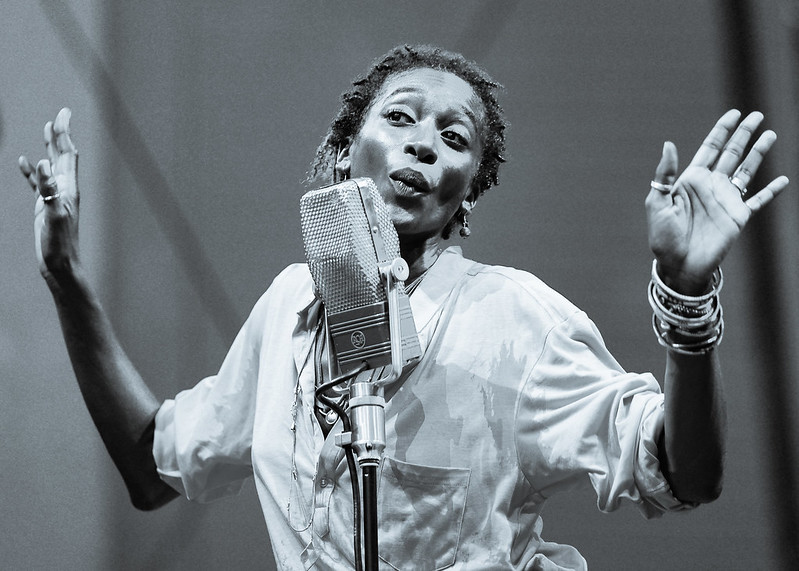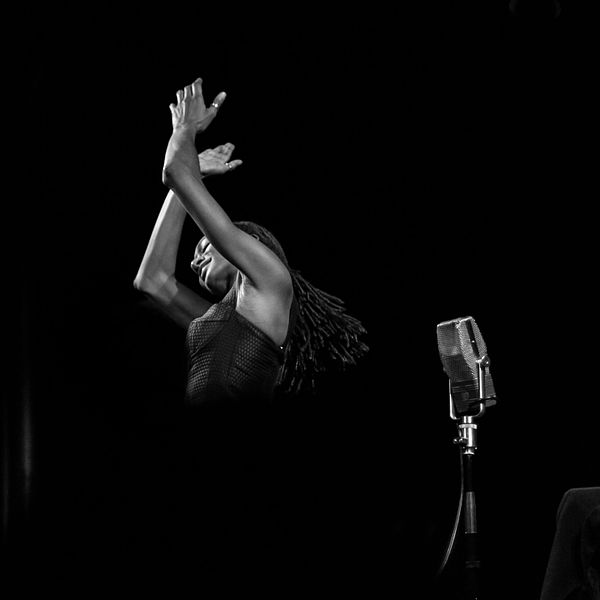Despite her music being released in the 2010’s, Ala.ni could just as easily, if not more so, have succeeded during the turn of the twentieth century when the likes of Billie Holiday and Vera Lynn enchanted listeners with their love-soaked ballads. The London-born, Paris-based singer shares much of the sound and sentiment of this era; her voice is undeniably the centerpiece of her music as it warbles about her experience with relationships over sparse instrumentals. It is at once dreamy, seductive, and graceful.
Her debut album, You & I, is a beguiling showing of Ala.ni’s vocal and songwriting abilities as she effortlessly weaves together a story about an affair. The delicate, torch-singer delivery sounds more fitting for the static airwaves of a five-tube than any modern-day technology. Even her follow-up, ACCA, a jazzier and more upbeat effort, maintains these classic sentiments as her powerful singing is the centerpiece on the almost entirely a capella album.

Steven Pisano via Flickr
Journey to Ala.ni
This distinct style, however, is far from tacky pastiche as this is the music that Ala.ni has looked up to her entire life. Raised on cabaret, calypso, and other vocally-dominated music, the London native, born Alani Gibbons, found a great deal of confidence in these genres throughout her youth. Even from a young age, she seemed destined for a career singing as evident from a promising performance of Somewhere Over the Rainbow at age three.
To pursue such a career, Ala.ni enrolled at the prestigious Sylvia Young Theater School. Instead of encouraging this goal, however, Gibbons was met with a significant amount of resistance. She would be told that classical vocal pop was not for a young, black girl like herself; Ala.ni would face this criticism throughout her life as many people could not see through her Grenadian heritage.
This discouragement, however, did not match the confidence and tenacity that she found through music. After all, she had admired Julie Andrews since childhood, took great pride in her family’s rich musical heritage, and still had an abundance of natural talent. She would not sacrifice her career on such irrelevant grounds.
So, after graduating from Sylvia Young, Gibbons took the first steps in her music career. She began to build a modest reputation by performing background vocals for a variety of artists including Mary J. Blige, John Legend, and Blur.
However, this position did not bring her much, if any, satisfaction. She felt disillusioned with her career as she was only working for others and not pursuing her own musical goals. However, her career would take a sharp turn for the better in 2012.
Development
While visiting Grenada, she suddenly found the inspiration for two songs, “Cherry Blossom” and “I’ll Remember”. Away from formal recording environment and equipment, she recorded the songs a capella on an iPad. She continued to work on these songs upon returning to London, this time at a professional recording studio, Blur’s Studio 13. However, this was the only luxury Ala.ni indulged in whilst creating her first few songs.
She opted for a D.I.Y, low-budget approach which equated to her essentially doing all the heavy lifting herself; she wrote, recorded, produced, and funded all her work entirely with the only external help coming from the occasional studio player. Additionally, she achieved the retro sound to her music by often recording (and eventually performing) with old school instruments such as wax cylinders and a 1930’s RCA microphone.
Eventually, her first songs evolved into a four-part EP series that tell the story of an affair through the four seasons. The success of these efforts encouraged Ala.ni to release them together as a full-length album. The final product, You & I, released in 2015 and was deservedly embraced by fans and critics alike.
You & I (2015)
Centered around a hopeless love-affair, the record chronicles its journey from innocent, seductive beginnings to the inevitable, somber ending. Ala.ni punctuates the subtle feelings associated with each stage of the relationship by ascribing them to nature during the seasons. The romance buds in the spring, blossoms further during summer, withers during autumn, and finally meets its unavoidable fate in winter.
The tracks in each section develop this extended metaphor further by matching the lyrical and sonic tones with those of the seasons. On the ‘spring’ tracks, Ala.ni’s light-footed voice dances playfully over ever-so-slightly buoyant guitar work; this delicately seductive performance evokes the promising feelings of newfound love.
By the time ‘summer’ comes around, the cute warbling of ‘spring’ slows and steadies just as the relationship develops and becomes more impassioned. Rather than flirting with the light-hearted guitar melodies, Ala.ni performs love-professing ballads over deeper piano and bass-driven tracks.
And just as the flora begin to lose their fruits in the latter seasons, so too does the relationship in You & I. On the B-side, Ala.ni expresses a somberness that is well-distanced from the initial infatuation of spring and summer. She trades delight for melancholy as the mortality of the love affair slowly becomes a painful reality. This suppressed anxiety finally reaches a bittersweet climax with closer “Circle” that reflects on the doomed nature of such ordeals.
This emotionally compelling and layered composition of the story is just one of the many merits of You & I. Ala.ni’s dazzling torch-singing, her timeless song-writing, and the sparse but delicately chosen instrumentals all help the record earn the title of one of the best debuts in recent years.
Recognition
Even more impressive is the fact that Gibbons handled almost every aspect of the project herself. And with how well the final product turned out, it shows just how musically gifted and mature she is. However, as much as her musical acumen helped, her drive and self-confidence cannot be ignored. To go through the demanding process of creating an album alone is not for the faint hearted. It demands a great deal of tenacity. But it is no surprise that Ala.ni has this. The racist discouragement that she endured while pursuing a career in music helped her develop a self-assured perseverance that shines on You & I and would once again surface on her next project.
The success of her debut showed the world not only that Ala.ni was capable of torch-singing but that it was commercially viable nearly a hundred years after its prime. The album’s reception found her headlining festivals, touring with the likes of Rufus Wainwright, and even slotting an appearance on Later… with Jools Holland. Now with more publicity, fans and critics anxiously awaited the return of Ala.ni’s beautiful singing.

Julien Munschy via Wikimedia Commons
Development of ACCA (2020)
In a display of her newly bolstered self-confidence, the singer-songwriter took an unexpected, and somewhat radical, route. Her new album would be entirely a capella. While the style is not radical in and of itself, Ala.ni had just emphatically proven how capable her voice was in a more organic presentation; to now choose a less natural style was undeniably surprising. But this was one of the main reasons why she chose it. She did not want to feel obligated to a particular genre.
She once again took on the project by herself, although this time the burden was significantly greater. Since the album was composed entirely of vocals (Ala.ni’s only, of course), their layering and manipulation took a considerable amount of work, especially when much of it was done on an iPad.
Just under three years of hard work finally ended in January of 2020 with the release of ACCA. While the sound is radically different from You & I, the theme of love is still present. However, only this time it is self-love. Ala.ni stands tall as she embraces her own strengths and abilities rather than fixating about someone else. Fittingly, the album has a much livelier, more upbeat sound than its predecessor; if You & I was made for slow-dancing, ACCA was made for large, bold movements as the promotional artwork suggests.
ACCA (2020)
The songwriting also contributes a great deal to this more celebratory feeling. Tracks like “Van P” and “Sha La La” are rich in self-confidence as they encourage listeners to move on from those that hold you back: “I guess I better find a new love// Someone to hug and trust”.
However, the album is not totally black-and-white in its ethos. Several songs still mourn over unrequited love such as closer “Gone” which sounds like it belongs more on You & I than ACCA. However, at the end of the day, even these more forlorn tracks still preach a message of overcoming with their danceable sound and non-binary lyrics.
While ACCA is not as focused and thematically robust as You & I, it definitely outshines the debut in creativity. Ala.ni’s use of her voice in place of instrumentals is outstanding. She replaces drums, bass, and more to create a deep, textured soundscape without ever sounding like its coming from a voice. This is further testament to Ala.ni’s artistic ability and determination. These two traits that make her one of the most compelling musicians today.
Final Thoughts
There is a lot to say about Ala.ni. Musically, her talent is phenomenal. You & I is a first effort that is as stunning as it is sonically unique. This is a trait that arguably fits her follow-up better. Creatively, her ability to innovate and explore new sounds is more than praiseworthy; after a rapturous showing of her ability at torch-singing, she attempted (and succeeded) an entirely a capella album. Personally, her attitude is unrelenting; she has persisted through adversity and always accomplished her goals, no matter how audacious they be.
All these traits and more make Ala.ni more than just an enjoyable and endearing artist- she is a role model… but not just for musicians. Ala.ni is a figure to look up to for anyone overcoming adversity, searching for self-confidence, or improving themselves in general.
